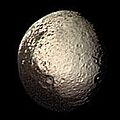ファイル:Iapetus by Voyager 2 - enhanced.jpg
Iapetus_by_Voyager_2_-_enhanced.jpg (350 × 350 ピクセル、ファイルサイズ: 19キロバイト、MIME タイプ: image/jpeg)
ファイルの履歴
過去の版のファイルを表示するには、その版の日時をクリックしてください。
| 日付と時刻 | サムネイル | 寸法 | 利用者 | コメント | |
|---|---|---|---|---|---|
| 現在の版 | 2005年4月4日 (月) 17:29 |  | 350 × 350 (19キロバイト) | Smartech~commonswiki | *'''Iapetus by Voyager 2 spacecraft, August 22, 1981''' *same as Iapetus_by_Voyager_2.jpg but focused on the mooon and feature-enhanced. *original image caption: Saturn's outermost large moon, Iapetus, has a bright, heavily cratered icy terrain and a da |
ファイルの使用状況
以下の 4 ページがこのファイルを使用しています:
グローバルなファイル使用状況
以下に挙げる他のウィキがこの画像を使っています:
- ar.wikipedia.org での使用状況
- be-tarask.wikipedia.org での使用状況
- be.wikipedia.org での使用状況
- ca.wikipedia.org での使用状況
- de.wikipedia.org での使用状況
- el.wikipedia.org での使用状況
- en-two.iwiki.icu での使用状況
- eo.wikipedia.org での使用状況
- es.wikipedia.org での使用状況
- eu.wikipedia.org での使用状況
- fr.wikipedia.org での使用状況
- gl.wikipedia.org での使用状況
- hr.wikipedia.org での使用状況
- it.wikipedia.org での使用状況
- ko.wikipedia.org での使用状況
- la.wikipedia.org での使用状況
- lb.wikipedia.org での使用状況
- lt.wikipedia.org での使用状況
- lv.wikipedia.org での使用状況
- ms.wikipedia.org での使用状況
- mwl.wikipedia.org での使用状況
- no.wikipedia.org での使用状況
- pl.wikipedia.org での使用状況
- ro.wikipedia.org での使用状況
このファイルのグローバル使用状況を表示する。




